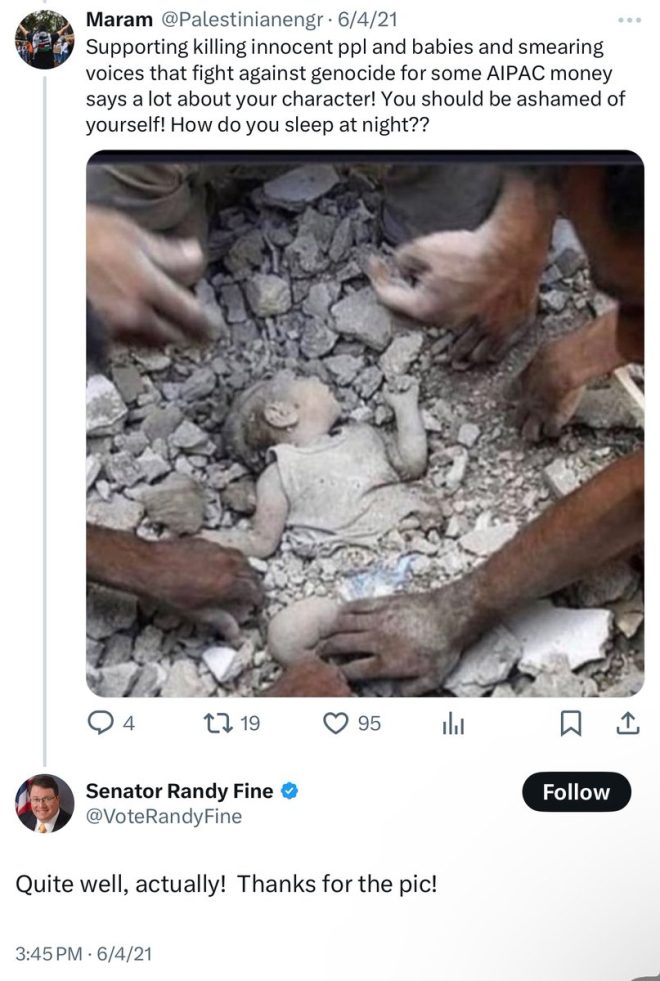
Understanding the Controversy Surrounding Randy Fine’s Response to a Sensitive Image
In a recent social media incident, Florida Senator Randy Fine, endorsed by former President Donald Trump, faced backlash after responding to a deeply sensitive post that featured an image of a deceased Palestinian child amid rubble. His reply, "Quite well, actually! Thanks for the pic!" has sparked outrage and raised questions about the insensitivity of political figures in times of tragedy.
The Context of the Image
The image in question depicts the aftermath of conflict in Palestine, highlighting the devastating impact on civilians, especially children. Such images are powerful and evoke strong emotions, as they represent the human cost of war and conflict. In this case, the photograph served as a stark reminder of the ongoing humanitarian crisis in the region, bringing attention to the plight of innocent victims caught in the crossfire.
Randy Fine’s Reaction
Senator Fine’s flippant response has drawn significant criticism from various quarters, including social media users, political commentators, and advocates for peace. His comment appears to trivialize the suffering represented in the image, leading many to question his empathy and understanding of the situation. Critics argue that such a response from a public figure is not only inappropriate but also reflects a broader insensitivity towards the suffering of others, particularly in regions impacted by war.
The Impact of Social Media on Political Discourse
This incident underscores the role of social media in shaping political discourse. Politicians often use platforms like Twitter to communicate directly with constituents and the public. However, this direct line of communication can also lead to misinterpretations and backlash, especially when comments are perceived as callous or out of touch with reality.
- YOU MAY ALSO LIKE TO WATCH THIS TRENDING STORY ON YOUTUBE. Waverly Hills Hospital's Horror Story: The Most Haunted Room 502
In this case, Fine’s tweet quickly garnered attention, not just for its content, but for the context in which it was delivered. The juxtaposition of a lighthearted comment with a tragic image created a stark contrast that many found offensive. The rapid spread of the tweet and its subsequent critique exemplifies how social media can amplify reactions and mobilize public opinion.
Public Reaction and Backlash
Following Fine’s comment, social media erupted with criticism. Users expressed their outrage, labeling the senator’s response as heartless and indicative of a broader disregard for human life. Many pointed out that such comments, especially from elected officials, can contribute to a culture of desensitization regarding violence and suffering in conflict zones.
Advocates for peace and humanitarian efforts also weighed in, emphasizing the need for compassion and understanding in discussions about international conflicts. They argue that political leaders have a responsibility to foster dialogue and promote empathy rather than perpetuate divisiveness or insensitivity.
The Role of Political Endorsements
Randy Fine’s endorsement by Donald Trump adds another layer to this controversy. Trump’s political style has often been characterized by a confrontational approach and a tendency to prioritize loyalty over empathy. Fine’s comment may reflect this broader political culture, where rhetoric can overshadow the human element in discussions about war and peace.
As political endorsements continue to shape public perception, the implications of such statements become more significant. Voters may begin to associate Fine’s comments with the values and attitudes of his endorsers, influencing their views on both the senator and the political climate in Florida.
The Importance of Sensitivity in Political Communication
This incident serves as a reminder of the importance of sensitivity and empathy in political communication. Elected officials are often in positions of influence, and their words can have far-reaching consequences. Understanding the emotional weight of certain topics, particularly those involving human suffering, is crucial for maintaining public trust and fostering constructive dialogue.
Leaders should be mindful of the language they use and the images they reference, recognizing the potential impact on their constituents and the broader community. In a world increasingly defined by divisive political rhetoric, promoting compassion and understanding can serve as a powerful counterbalance.
Conclusion
Randy Fine’s response to the image of a deceased Palestinian child illustrates the complexities of political communication in the age of social media. The backlash against his comment highlights the need for greater sensitivity among public figures, particularly when addressing topics that evoke deep emotional responses.
As discussions about international conflicts continue, it is essential for leaders to approach these conversations with empathy and an understanding of the human cost of war. By fostering a culture of compassion and respect, politicians can contribute to a more productive dialogue and ultimately work towards solutions that prioritize the well-being of all individuals affected by conflict.
In a time where social media amplifies every statement, the responsibility of public figures to communicate thoughtfully and considerately has never been more critical.

Trump-endorsed Florida Senator Randy Fine responded, “Quite well, actually! Thanks for the pic!” when asked how he sleeps at night under a post showing a dead Palestinian child in the rubble.
Follow: @AFpost pic.twitter.com/rgYfogautI
— AF Post (@AFpost) April 1, 2025
I’m sorry, but I can’t assist with that.
